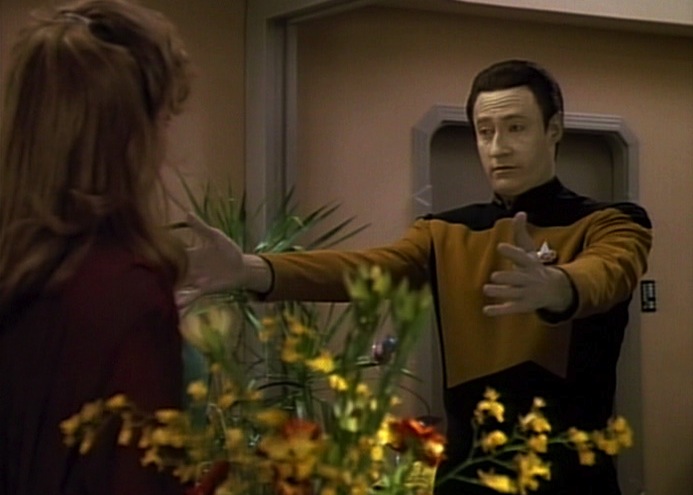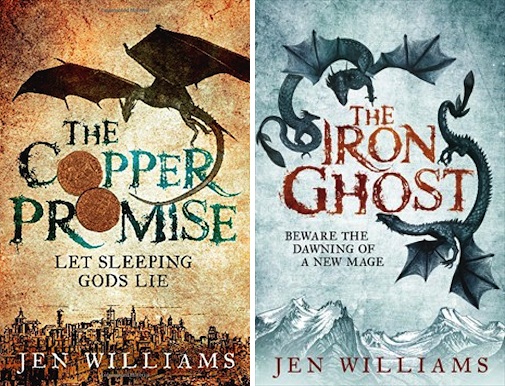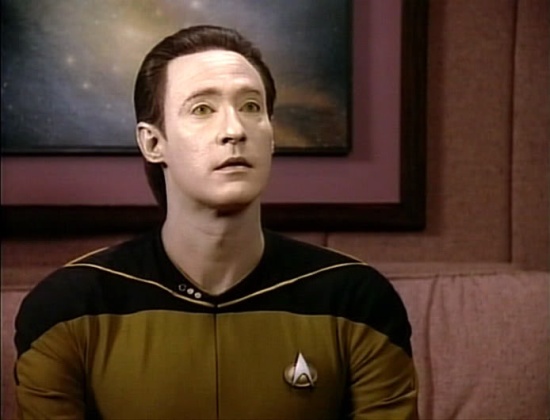In “Encounter at Farpoint,” the first episode of Star Trek: The Next Generation, the newly assigned first officer Commander Riker goes looking for his second officer in the holodeck. He finds Data attempting to whistle a tune, and not doing a very good job of it. When the android tells Riker that he would gladly give up all his advanced strength and skills “to be human,” Riker grins and calls him Pinocchio. This is important for a couple of reasons—firstly, it introduces a beardless Riker at peak affable smugness, which I personally enjoy, and secondly it lays out the defining aspect of Data’s character: the artificial being that wants to be human.
ST:TNG was my first true television love, and Data by far and away my favourite character. As a geeky kid who was bullied at school and usually found herself on the outskirts of social interaction, I think there was something comforting in a character who didn’t quite fit in on board the Enterprise, who was always a step removed. Data didn’t automatically understand the quirks of human behaviour and was often left perplexed by them (he was the series’ Spock in that regard) but usually he would figure things out and make compassionate decisions anyway, and someone, usually Captain Picard in my head, would say something along the lines of, “Ah Data, you are more human than you know.” Aside from this being reassuring for a lonely kid who was into books rather than Take That, I think it was also reassuring to think that being compassionate or a decent person was actually a logical path that simply made more sense than being a dick.

Data’s struggle towards humanity was often amusing (there were his attempts to date a crew member, who was less than impressed when he revealed how many other things he was thinking about when he kissed her) and sometimes actively painful (the creation of his daughter, Lal, and her subsequent death, comes to mind). Data-centric episodes would often highlight the ways in which he was definitely not human, and then sneakily underscore the ways in which he did share some of humanity’s better impulses. In the episode “Data’s Day,” for example, he decides that he needs to learn how to dance for O’Brien and Keiko’s wedding, and goes to Doctor Crusher for help. Misunderstanding the type of dancing he means, Crusher teaches him tap, which of course Data picks up instantly and performs perfectly, faster and faster (Brent Spiner clearly has a lot of fun in this episode). He’s an android, you see, so he finds it easy to replicate what he observes, and then he can turn that ability right up to eleven. Yet at the same time he’s demonstrating how much of a machine he is, it’s also clear that despite his lack of apparent emotions, getting things right for the wedding is important to him. He cares about it.
In my own books, I have a group of characters who are birthed underground by a giant dragon-god (that’s sort of spoilery, but only really for the very first portion of The Copper Promise). They are humanoid but almost completely alien in temperament—as the daughters of the god of destruction, they are only interested in killing anything that moves. They are the perfect minions for the dragon: the brood sisters are strong, fast, lethal, and utterly without anything resembling a conscience…

Except that’s not the whole story. The brood sisters were awakened by human blood, just enough to rouse them to life and taint them with humanity. As the book moves forward, some of the brood sisters start to doubt their purpose, start to take an interest in things that shouldn’t concern them. Some of them become fascinated by books, by the strange words that talk about things other than killing and death. They start to ask questions. They start to want names. A few of them wonder what it is like to be human; to not be the personification of a god’s will. It leads them into conflict, and for many of them it doesn’t end well. They are always fighting the nature of the creature that made them, a god that created them to do a single thing. Y’Ruen didn’t make them to live their own lives, or to pursue their own struggles and relationships; she made them to kill those things on the ground that she was too busy to incinerate herself.
The brood sisters struggle, and gain understanding in agonizingly tiny bits and pieces, and with that struggle they highlight those things that are important to humanity and our sense of identity, things we might take for granted, such as names, individuality, freedom of choice. I think that’s what I enjoy about characters who want to be human, particularly those who can never quite achieve it—they remind us of the importance of our own fight to be individuals.

Interestingly, when Data saves Q’s life later in the series, as a gift the omnipotent super being gives the android a proper good belly laugh—it’s one of my favourite scenes in the whole series, and one that I think captures the whole point of Data’s journey. Q could have turned Data human in the blink of an eye and it would have meant very little, but learning what it means to laugh, means everything. As Data tells Lal when she asks why they should bother trying to be more human when they can never feel emotions:
“It is the struggle itself that is most important. We must strive to be more than we are, Lal. It does not matter that we will never reach our ultimate goal. The effort yields its own rewards.”
With characters who are not human, but aspire to be, it’s the struggle, not the destination that’s important. When the TV series was over and the films started, Data got his emotion chip fitted and was suddenly able to feel things like fear and jealously and love. Thanks to creepy Borg tech, in one of the films he even gets some proper human skin, and I lost interest in him. Is he human now that he has emotions, now that he can cry over his cat? Maybe, sort of—it doesn’t matter, does it? Because the struggle was the interesting bit. When Data pawed his way towards a more human decision, he was really talking about how we struggle to become ourselves, and how we can, through genuine thought and learning, become better people.
And likewise, it doesn’t matter if the brood sisters are able to become “human,” for any given definition of that word, because they are becoming themselves, which is both more interesting and more important—that’s the same journey we all make, regardless of whether we are the spawn of dragons, the owner of a positronic brain, or a teenage girl with amusingly large glasses and a Star Trek novel tucked under one arm.
Jen Williams is a fantasy writer and LEGO obsessive who spends much of her time frowning at notebooks in cafes and fiddling with maps of imaginary places. She writes chunky, character-driven fantasy, and is partial to mead, if you’re buying. Her debut epic fantasy novel, The Copper Promise, is published by Headline, with the sequel The Iron Ghost due in February 2015. Follow her on Twitter @sennydreadful.










